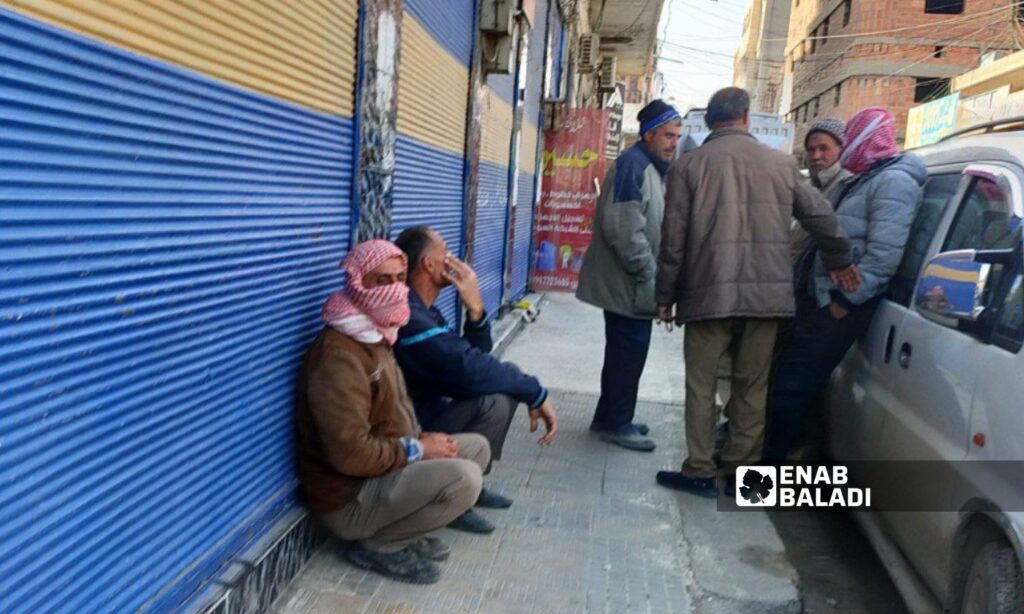Qamishli – Majd al-Salem
From the Jumaayeh neighborhood on the eastern outskirts of Qamishli, Ahmed al-Ali (46 years old) heads to the main street in front of the municipality building almost daily during the early morning hours, waiting for a job opportunity alongside dozens of other day laborers who have flocked to the area.
The hope of finding work is overshadowed by sorrow due to the low financial compensation and the “great” physical effort exerted, as al-Ali said, “We do everything for nothing.”
Al-Ali is a representative of dozens of workers who complain about the harsh living conditions and the difficulty of meeting their family’s needs, especially with the approaching winter and the expenses imposed by the cold.
For three dollars
Demand for daily labor decreases during the winter, as most locals and contractors postpone their work during rainy days, which means there’s little chance of even securing “a loaf of bread” for his family of four, according to day laborer Ahmed al-Ali in an interview with Enab Baladi.
Sometimes, the man gets a chance to move household furniture or lift gravel, sand, and stones for contractors and others for several floors in construction sites, or perhaps he works in cleaning gardens or opening blocked sewage channels, adding that all of this earns him a daily wage ranging from 30,000 to 50,000 Syrian pounds (three US dollars).
Day laborers in Qamishli gather in several places, the most famous being in front of the municipality building in the market, and at the roundabout at the western entrance of the city on the road to Qamishli.
According to information gathered by Enab Baladi from local male and female workers, the situation is worse for women who work as day laborers (carrying food items), as they work in teams (groups) where each group consists of about 20 girls supervised by a woman, with an agreed payment that does not exceed 35,000 for each worker, and these groups may remain “for weeks” without work.
Wages are low compared to the cost of meeting family needs. According to the Kassioun Index for Living Costs, the average living cost for a Syrian family of five has risen to “more than 13 million Syrian pounds” (850 US dollars), whereas the government-mandated minimum monthly wage is about 18 US dollars, and it is about 70 US dollars for the Autonomous Administration of North and East Syria (AANES).
Day laborers waiting for a job opportunity in Qamishli – November 13, 2024 (Enab Baladi/Majd al-Salem)
Transportation burdens workers
Majid al-Nazal (38 years old) considers himself lucky since he owns a motorcycle that takes him to the gathering place for day laborers in front of the municipality building, as he comes every morning from his nearby village in the southern countryside of Qamishli on his motorcycle.
Al-Nazal told Enab Baladi that rising transportation costs impact day laborers, especially those coming from the countryside, as they bear the cost of the journey even when there isn’t a job opportunity, and during rainy winter days, they can’t make the trip.
Al-Nazal noted that he tries his best to help workers close to his residence by taking them along on his motorcycle to save on travel costs both ways.
However, Al-Nazal finds it challenging to afford fuel for his motorcycle at reasonable prices, especially with the fuel shortages currently experienced in the region.
According to Enab Baladi observations, transportation costs to and from the Qamishli countryside have risen from 8,000 to 10,000 pounds per passenger (the round trip costs the worker 20,000 Syrian pounds), which equals about half of his daily wage, as fuel prices have increased from 4,700 pounds per liter of diesel to 6,000 pounds, and gasoline now costs 8,000 pounds.
Additionally, public transportation (minibuses) have raised fares from 1,000 to 2,000 pounds per passenger, and private taxis have increased their fares from 15,000 to 25,000 pounds.
As a more economical solution to this issue, day laborers within the city have resorted to using bicycles for transportation, as observed by Enab Baladi.
“Lost rights and control over wages”
Al-Nazal added to Enab Baladi that day laborers’ rights are lost, and they constantly find themselves subjected to their employers’ control over daily wages, resulting in numerous disputes.
He mentioned that “the hardest” thing a worker can experience is getting injured while working, as the employer does not “bear any responsibility,” and any assistance he provides for treating the injury is merely a “favor” from him.
The Autonomous Administration established what it called the “Union of Laborers” in 2015. In a statement by Shiro Mohammed, the president of the union, on October 31, he said, “We have established a system for workers that includes clauses to protect their rights, assist them, and train them.”
He noted that around 70,000 workers have benefited from the union and that they have established a fund to assist injured workers, with about 11,000 workers registered in it.

